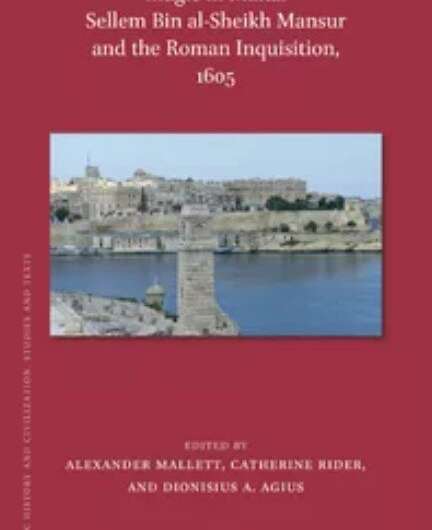Ancient documents give unique glimpse into Malta’s magic history

From love charms to getting rid of demons and curing illness, ancient documents give a unique glimpse into how rich and poor in Malta used magic to improve their lives.
Papers recording the trial of a Muslim slave hauled before inquisitors show fascinating detail about Maltese society in the seventeenth century.
Unlucky Sellem bin al-Sheikh Mansur probably faced charges because his magical practices didn’t work in the way those who had paid him had hoped. Shopkeepers, cobblers, carpenters and knights had thought his services would cure their illnesses or find them love and wealth.
They appeared voluntarily before the office of the Roman Inquisition on Malta in the spring and early summer of 1605 to confess that they had employed Sellem to do magic for them.
Sellem was also accused of practicing other, more learned types of magic. Vittorio Cassar, an architect and servant-at-arms of the Knights of St John, who ruled the island at the time, claimed Sellem taught him a form of divination called geomancy, which involved drawing dots in random patterns and then interpreting the results to answer questions about the future. Cassar also gave the Inquisitors a treatise that he claimed to have written under Sellem’s direction. He claimed that Sellem had offered to teach him a form of magic called in Latin reuchania (from the Arabic rūḥāniyya), which involved summoning up demons.
Later witnesses, such as a French knight of the Order of St John named Pietro La Re, said Sellem had called up demons for him and had recited incantations from a magic book.
The proceedings against Sellem were recorded in a trial document, now preserved in the Metropolitan Chapter Archives in Mdina, Malta. The research is now published in a book,” Magic in Malta, 1605: Sellem bin al-Sheikh Mansur and the Roman Inquisition,” edited by Alex Mallett, and Dionisius Agius and Catherine Rider from the University of Exeter.
Sellem did eventually admit to practicing healing and love magic for some clients, although he also said that he did not really know magic and his spells were “jokes” or fakes, which he made up to earn money from gullible Christians. He admitted teaching Cassar geomancy and told the Inquisition that he had learned astrology and geomancy from his father in Cairo. However, he repeatedly denied knowing anything about how to call up demons and said he had never owned a magical book. Even when the Inquisition put him face to face with his accusers and used torture, he refused to admit that he had used these more serious and demonic forms of magic. “If I knew that,” he said, “then I would not be a slave in Malta!”
Sellem was found guilty and sentenced to be paraded around the cities of Birgu and Valletta and then tied to a pillory in Valletta’s main square for an hour. After this, he was sent back to prison for an unknown period and disappears from the historical record.
The Inquisition in Malta was established by the papacy in 1542 through the papal bull Licet ab initio, primarily as a response to the perceived threat from Lutheranism but also as a means of protecting the Catholic faithful from a wider variety of errors.
Professor Agius said, “At the time Muslim slaves made up approximately ten percent of the population. The freedom they were given fluctuated. It was restricted at times when they were thought to be over-familiar with Maltese housewives and or became involved in robberies. Slaves who were involved in trade were believed to have a negative effect on the morals and beliefs of Maltese women; not only were some slaves thought to be intimate with Maltese women, but the love magic potions which they sold were particularly dangerous from the point of view of the Inquisition. Only a very small number of slaves could have made significant money from their activities, and what they did make was usually spent on food, wine, tobacco, medicines, and women.”
Professor Rider said, “Sellem’s case sheds light on attitudes towards on magic in the early seventeenth century and gives a glimpse into Islamic and North African practices and attitudes to magic, as well as forms of love magic, divination and healing more commonly found in Christian Europe. It also tells us about everyday relations between Christians and Muslims at the time.”
Citation:
Ancient documents give unique glimpse into Malta’s magic history (2022, September 23)
retrieved 23 September 2022
from https://phys.org/news/2022-09-ancient-documents-unique-glimpse-malta.html
This document is subject to copyright. Apart from any fair dealing for the purpose of private study or research, no
part may be reproduced without the written permission. The content is provided for information purposes only.
For all the latest Science News Click Here
For the latest news and updates, follow us on Google News.

